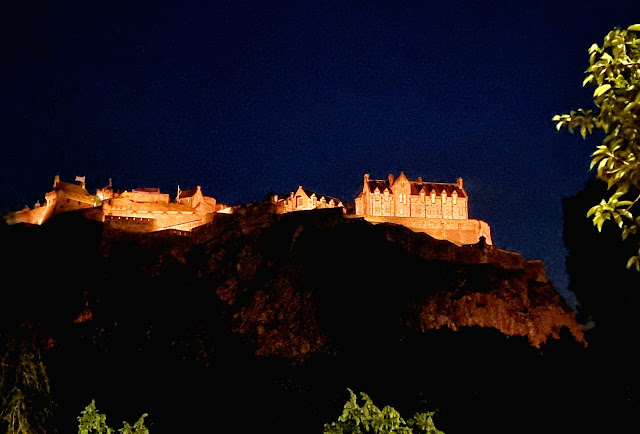Mid-August 2023
The head of the British Museum
has resigned. It has been pointed out
that many items have been stolen – probably by staff – and have appeared on
retailing websites, and nothing has been done.
As usual, the cartoonist Matt sums it up well.

The weather remains disappointing
but reasonably warm. The news, at least
the national news, remains dispiriting.
Sadiq Khan, London mayor, firmly intends to bring in his ULEZ (Ultra Low
Emission Zone) expansion from 29th August. His figures for death related to pollution
are disputed by many, and the legislation will hit poorer people who own older
cars more than richer people (have you noticed that the only people who drive
electric cars are wealthy?). Planned
rail strikes will force many to drive (including ourselves – we were planning
to catch the train to London and then cycle to the Brentford vs Bournemouth
match in a week’s time). Traffic calming
measures – speed humps and chicanes actually increase fuel consumption and thus
pollution. Oh dear. We have also had more doctors’ strikes,
including consultants. The press points
to the high salaries which consultants earn.
An antipathetic strategy.
One lovely day – a Sunday – and
we introduce some Swiss friends to a section of the Dorset coast which they
have not seen before. They are keen
walkers and have been steadily devouring the Southwest Coast Path for some
time. Being Swiss, they had been perplexed
to find that it was not possible (on a weekday) to walk from Kimmeridge to
Lulworth). Of course, the reason is that
the British play war games during the week and the coast is off limits. Starting from Whiteways car park on the
Purbeck ridge, we walk along Flowers Barrow, almost to Arish Mell, the tiny
beach in the midst of the Lulworth Army Reserve, and then back around the coast
to Worbarrow. A visit to Tyneham (the
little village commandeered by the Army in about 1943) also engenders Swiss
interest, and perhaps puzzlement.
 |
| The Dorset coast, looking towards the 'Isle of Portland' |
18th August
Fly to Edinburgh for my usual
delve into the Good, the Bad, and the Ugly which is the Edinburgh Festival and
its ‘Fringe’. My friend G….., from
medical school, who lives in Edinburgh, and I, have been exploring this for
well over 40 years. I have to have an
excuse to go these days – the Fringe is too unpredictable, though there is
always a good exhibition on at the Royal Scottish Academy. When looking through the main Festival
programme, early in the year, two things caught my eye. One, the Threepenny Opera by Bertolt
Brecht/Elisabeth Hauptmann/Kurt Weill, to be performed by the Berliner Ensemble
(Brecht’s original company). Two, the
Alvin Ailey American Dance Theater, a (mostly) black ballet company I saw in
North Carolina in the early 1980s. For
many years, some of the great American dance companies were unable to tour
Britain because they used recorded music.
Equity (or was it the Musicians’ Union?) would not allow it. Obviously, the current troupe would not have
been born the last time I saw the company (!) but it seemed too good an
opportunity to miss.
But Edinburgh is a wonderful place...
 |
| Edinburgh castle from the west end of Princes Street |
 |
| Edinburgh castle at night |
 |
| Art everywhere - an Anthony Gormley stands in the Water of Leith |
My friend’s husband is happy
playing his bagpipes (last appearance on the Fringe in the wittily named ‘Game
of Drones’) or practising Scottish fiddle music, and rarely accompanies
us. In the mornings, over breakfast, we
study The Scotsman review pages and ring immediately to book anything that sounds
good.
Some of the shows appeal by
virtue of their names.
For example, ‘First piano on the
moon’, ‘Ay Up Hitler!’ (which apparently is based on the assertion that Hitler
escaped to Yorkshire), and the intriguing but coarse, ‘Why I stuck a flare up
my arse for England’ (something to do with football).
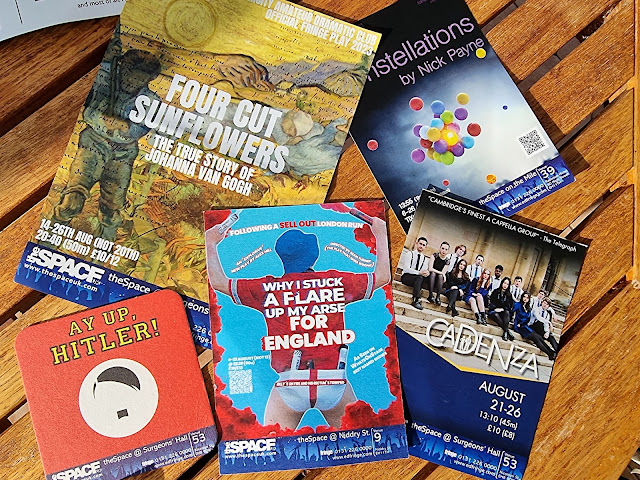
Edinburgh is always full of
ghosts for me. Ghosts of my earlier
self, ghosts of my friends who studied there in the late 1960s while I was
living in Argyllshire, and ghosts of relatives.
My father was apparently born there in 1918, possibly because his father
was in uniform (the family came from Helmsdale, however, in the far north east). My mother’s cousins both studied there, one
medicine, one veterinary science. It is
with a curious sense of retracement that we walk from the mound via the
writers’ museum to Summerhall. This is a
fringe venue, and it is in the old Veterinary School, known as The Royal
Dick. Capable of misinterpretation, it
is actually named after William Dick, originally a farrier from Cannongate, who
began veterinary education in Edinburgh in the early 19th Century, and
his school received the Royal Assent and title in 1906. The old anatomy lab is now a reasonable bar,
surrounded by glass cases with historic items of laboratory ware and high up on
the walls, an assortment of animal skulls.
Hunker down for a coffee.
Into the ‘First Piano on the
Moon’. Will Pickvance, an acrobatic and
brilliant pianist, essentially a show for children from 5 to 95. Great entertainment as Will does badly at
school, but then gets an invitation to play at Mozart’s birthday party in
Salzburg.
The afternoon, or most of it, is
spent in G’s Scottish Arts Club, a venerable institution in an old building in
Rutland Square.
It seems unlikely that the American
protagonist will read this (fortunately), but G, as senior member present, has
the job of introducing ‘Scottish Voices’, a group of excellent singers, whose
job it is to sing some modern renderings of mainly Scottish, and predominantly
Gaelic poetry, to piano parts composed by somewhat minimalist composers. One of these is a Bostonian woman who has
wangled a Fulbright scholarship (no doubt all expenses paid) to live and work
in Edinburgh and to compose tunes (I use the word in its widest sense) to which
the poetry can be sung.
After some passable works by
Hamish McCunn we are onto the Gaelic songs (typical example ‘Elegy for George
Floyd’ – or ‘Cumha Sheòrais Floyd’), and eventually the major work ‘Mac-Talla’
or ‘Echo’ introduced by the earnest Bostonian.
Unfortunately it seems that the work was curtailed when the designated
Hebridean poet, Aonghas MacNeacail (Angus McNicoll to you and me), died. G leans over to me and suggests sotto voce
that he was fed up with being plagued by the earnest Bostonian for more poetry.
All things, good or otherwise,
come to an end, and we meander to Fountainbridge for a reasonable pub meal
before heading up to the Edinburgh Festival Theatre for the main event, the
Berliner Ensemble version of The Threepenny Opera.
What a bleak play. Exciting, engrossing, and an outstanding
performance by Gabriel Schneider, a charismatic Mackie Messer (aka
Macheath). Great music from the Weimar
era played by a superb 7-piece band. The
main characters are self-interested and devious. Great acting from Kathrin Wehlisch as ‘Tiger’
Brown, the corrupt Chief of Police who is Macheath’s friend from their time in
the army. She played the role as a
puppet like Charlie Chaplin figure (whom Brecht was known to admire). The most sympathetic figures are all female,
undone by male duplicity. A powerful
evening.
It would be dull to detail all of
the other plays that we saw. Highlights
were a Dutch group of revue multi-instrumental musicians in ‘Slapstick Scherzo’
(see them if you can, anywhere they perform), and a curious play, hard to
describe, using entirely cardboard props, graffiti covered, all in mime, called
‘The Ice Hole’ – see it if you can. We
saw talented young performers – will they make it in the big bad world of
theatre, music, and drama? Who knows.
Alvin Ailey American Dance
Theater was a final highlight. Thank
heavens the Equity ban has somehow been circumvented. A joyous finale. To see staid Edinburgh burghers on their feet
clapping and dancing at the final encore was remarkable.
Best exhibition – undoubtedly the
gamut of Grayson Perry’s works at the Royal Scottish Academy. Not to be attended if easily offended, or if
you might take exception to Grayson’s concept that his favourite teddy bear,
Alan Measles, is really God. There is a
free App called ‘Smartify’ which gives an audioguide narrated by Grayson –
worth listening to – I think it is still available.
 |
| A modern 'Rake's Progress - Grayson Perry |
 |
| A Grayson Perry pot - note Alan Measles |
Back in Poole, Lindsay has had a
great time walking with friends in Switzerland, temperature in the 30s, and
eventually this freak weather arrives with us, with September temperatures now
over 30 degrees in the U.K. This makes
morning swims in the sea very pleasant.
Saturday September 2nd
To London, to watch Brentford
play AFC Bournemouth. We intended to go
by train, but there was a train strike, so we had to drive with our bicycles to
Kingston, incurring Mr Khan’s ULEZ charge.
We reached the stadium via the Thames path. As we leave, curious Bournemouth supporters
enquire how early we left this morning to cycle to Brentford. Final score 2-2.
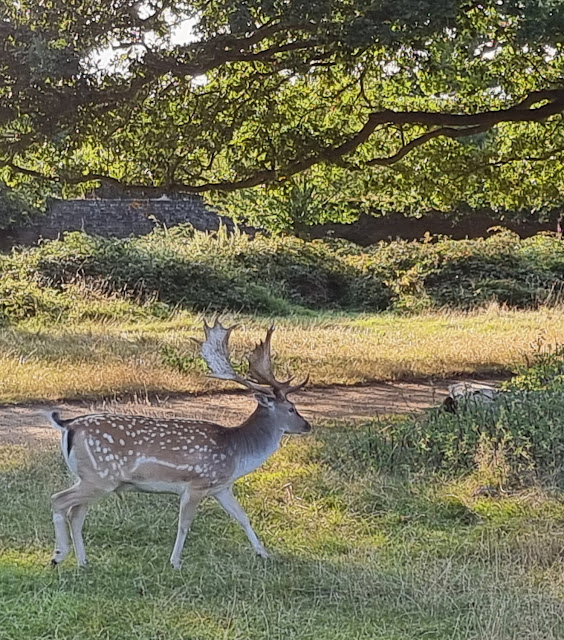 |
| Richmond Park, London, September 2nd |
September 7th
A hot and rather humid day
again. Oncology appointment today and
PSA is undetectable (good news), though this is expected with anti-androgen
therapy, and it is not until this is eventually withdrawn that one might
anticipate any tumour activity to reveal itself in PSA elevation.
I visited a colleague with metastatic
cholangiocarcinoma today, residing in a hospice for pain control and management
of hypercalcaemia. We lament that
doctors are not as shrewd as we were – not entirely unreasonably, since she had
to diagnose her own lower segment venous thrombosis herself. She also had chemotherapy induced angina due
to coronary artery spasm which she diagnosed herself.
Doctors do not seem to listen
properly to patients these days. I saw
an acquaintance last week (aged 65; ex-smoker) who has been from pillar to post
(well, from GP to A&E to specialist advisers) with three months of
‘unexplained’ symptoms. Perhaps it
didn’t help that she first attended the GP and told him she was convinced she
had gastric cancer. Her symptoms began
in June – sudden onset of bilateral jaw ache after a heavy meal, radiating down
the front of her chest, lasting about 5 minutes, and sometimes accompanied by
sweatiness. Interestingly, rarely
brought on by exercise – but then she doesn’t exercise much. Now frightened to have anything more than a
bowl of soup in case the symptoms come on again. Diagnosis – prior to my seeing her - everything
from costochondritis to gastritis to pulmonary embolism, even after attendance
at the E.R. She had been treated with
anti-inflammatories and then antacids and acid suppressants. The obvious diagnosis: angina pectoris (pain
from coronary artery narrowing), had not been thought of. Result of conversation: a phone call to a
colleague who arranged a CT coronary angiogram which showed a critical right
coronary artery narrowing. She is on the
correct treatment and is scheduled for stent insertion (now done). In the 19th century, the great
physician Sir William Osler said, ‘Listen
to the patient for he (she) is telling you the diagnosis’. I think the problem with doctors today is
threefold: Firstly, lack of continuity in care.
Secondly, lack of time to sit and listen to patients resulting in snap
diagnoses which are often wrong.
Thirdly, lack of the hundreds of hours a month of clinical experience
which we had as juniors, together with a reluctance to actually examine
patients to save precious time.
In case the reader feels I am
getting too big for my own boots, here is a story against myself from 50 years
ago, during my time as a junior doctor. Some names have been changed:
“On one memorable evening, which I can
remember as if it were yesterday, I admitted a pleasant, slightly cadaverous
looking man in his 50s with breathlessness.
It was my first and possibly best lesson in how to get things wrong, and
how to jump to conclusions. The superb physician,
Maurice Pappworth, called these Procrustean Crimes, and it’s well worth
retailing this for the education of others.
Procrustes was an Athenian robber, who with his wife, lured travellers to
his house on the pretence of hospitality.
Once in bed he would tie them up and if they were shorter than the bed
stretch them to fit, or if longer than the bed, lop their limbs off to fit. Either way they wound up dead and
robbed. So, according to Pappworth, a
Procrustean Crime is stretching the diagnosis to fit the history, or the facts,
ignoring details which may make the diagnosis untenable.
In this case, poor Mr Durand, for that
was his name, had obviously lost weight.
He was breathless. He had coughed
up some blood. He was a cigarette
smoker. Over the heart there was a clear
cut murmur heard through the stethoscope, which was clearly audible in systole
(contraction) and diastole (relaxation) of the heartbeat. I surmised that this noise was a pericardial
rub (inflammation of the sac around the heart).
On the chest X-ray was a large white mass, close to the heart. It was the smoking and the haemoptysis that
made me diagnose lung cancer. It seemed
very straightforward. Weight loss –
another sure sign. A pericardial rub –
due to tumour infiltration of the heart.
It was Mike Creech, my registrar, of
course, who suspected otherwise. He
looked at the X-ray with me, and at the mass in the centre of the chest. He mused ‘I wonder if that shadow is the
aorta – but if so it is hugely enlarged.’
We went to talk to the patient.
‘Tell me about the breathlessness,’ said Mike.
‘Well’, said the patient. ‘I’ve been getting breathless for a while,
but it seems to be at night that I get most of the trouble.’
‘Tell me how.’ Said Mike.
‘Well, I can get off to sleep alright,
but then I wake up at about two or three in the morning, and I’m fighting for
breath, especially if I’ve slipped down off the pillows.’
‘And what do you do?’
‘Well, first of all, it feels as though
the room is terribly stuffy and I can’t get enough air. I sit on the edge of the bed and dangle my
legs over the edge, and after a little while I begin to feel a bit better.’
‘And do you do anything else?’
‘Yes, that’s the funny thing doctor, I
walk over to the window and throw it open, and I stand there and take deep
breaths. That makes me feel a lot
better. When I go back to bed I find I
can usually go back to sleep, but I have taken to using four or five pillows to
prop myself up.’
Mr Durand had just given a perfect
textbook description of heart failure, and the pulmonary oedema that comes on
when fluid returns to the circulation at night, especially in the recumbent
position. I remembered that the
distension of small blood vessels in the lungs can give blood tinged
sputum. Mike listened to the heart and
said that he suspected that the almost continuous heart murmur, my interpretation
of which was a pericardial ‘rub’ was in fact the to-and-fro murmur of severe
aortic regurgitation. A dose of diuretic
was given and the patient slept comfortably.
The diagnosis was confirmed by Dr Hollman the next morning. He told us that he suspected Mr Durand had
Marfan syndrome, or at least a forme
fruste of the condition where the aorta becomes dilated but the other
skeletal features of the condition are not obvious. My Procrustean crime had been to assume that
a cadaverous looking smoker was suffering from lung cancer – i.e. a prejudice. I had fairly recently given up smoking myself
and was, and to some extent still am, Messianic about stopping people
smoking. Then I went on to make the
signs that I observed fit in with my prejudgement of the case. This is not to say that I never made a
Procrustean mistake again – but is an illustration of one of my most dramatic
failures.
Mr Durand went to the National Heart
Hospital and underwent surgery by John Parker, whom I later came to know quite
well. The aortic valve was successfully
replaced and the ascending aorta was replaced with a sleeve of Dacron. He did well, but a few weeks later he
collapsed and sadly died, probably from a tear at the distal anastomosis (join
to the aorta) or a fresh rupture of the dilated descending aorta which couldn’t
be replaced. His wife came in to thank
us for our efforts. I said that I was so
sorry we hadn’t been able to save him.
She shook her head. ‘No, the
illness and problems that he had are over and gone. His problems are over. Mine are just beginning. I have to find what to do with the rest of my
life.’ So many times after this have I
heard similar sentiments. ‘His
sufferings are at an end. Mine are just
beginning.’”
September 8th
One year since the Queen died,
and one year since my grandson Arlo was born.
To Dorchester Museum for the one
concert that we are able to attend in the Purbeck International Chamber Music
Festival. A step up from its original
name which did not include the word International. Natalie Clein’s collaborators and friends are
so wide ranging that its new title is appropriate, with professors of music
from many countries taking part. The
highlight (for me at least) is the wonderful Schubert quintet in C major,
composed in 1828, just two months before his death, and unheard for another 22
years. Natalie plays a 1777 Guadagnini
cello (‘The Simpson’), and the other musicians are the Danel quartet, all
virtuosi in their own right. 55 minutes
of sublime music.
 |
| Natalie Clein and the Danel Quartet |
September 9th
Arlo’s first birthday party. As usual, these affairs are more for the
adults than the recipient. His parents
(both keen cyclists) are delighted with his present of a balance bike, even
more overjoyed than Arlo himself who doesn’t know what to do with it. Some Duplo (train set) appeals more. It is easier to put it in your mouth.
 |
| Bubbles |
September 11th
For some time we have thought
that it might be fun to cycle around Lake Constance (Bodensee). The cycle route is apparently very good and
often traffic free. There are many firms
which offer this holiday, we chose a German one based in Konstanz – Radweg
Reisen. As an experiment we decided to
hire electric bikes.
It’s an easy hop to Zürich and a
train goes directly from the airport northeast to Konstanz. It is something of a change to roll along
through rural Switzerland (the Canton of Thurgau) without mountains. Arable farming is the main occupation, and
particularly fruit and vegetables. An
occasional red kite or buzzard whirls over the farmland, and in one open field,
apparently gleaning after the corn is cut, there are several storks.
Konstanz is officially in
Germany, though no passport problems and we settle in to the Hotel Halm,
opposite the bahnhof. A long walk takes
us to the northern section of the city where Radweg Reisen are checking over
our bikes. It is a much easier journey
back. The bikes, made by German company
Velo de Ville, are very heavy and rugged, but with a small amount of power
selected the riding is easy. The
settings – Eco, Tour, Sport, Turbo – give some indication of the resources one
can summon up at the press of a switch (I know this is not news to aficionados). Dinner by the lake on a beautiful late
summer’s evening.
September 12th
Our first ride is westwards along
the small finger of the lake (Untersee) which leads directly to the Rhine,
which is crossed at Stein am Rhein. The
boundaries of Switzerland and Germany are a little confusing. Switzerland has both sides of the Rhine
here. Stein am Rhein is heaving with
tourists. It is said to be the best preserved
mediaeval town in Switzerland, with its complement of original or restored
buildings, an impressive gatehouse and tower, and many beautiful wall paintings
on the houses. It looks like something
out of Harry Potter, perhaps Diagon Alley, or Hogsmeade.
 |
| Stein am Rhein |
 |
| Diagon Alley |
Here, the electric bikes display
their advantages. There is a beautiful
old covered trestle bridge across the Rhine, some 10 km downstream – a detour –
but it doesn’t seem to be a hardship.
Gailingen, where the bridge is situated, has, as many towns or villages
on the lake and river do, an area called the Strandbad. This is a riverside or lakeside public park,
always beautifully maintained, where one can picnic, sunbathe, and swim. There are many locals floating down the Rhine
on their ‘noodles’, and presumably they get out somewhere and walk back. The river current looks quite fierce.
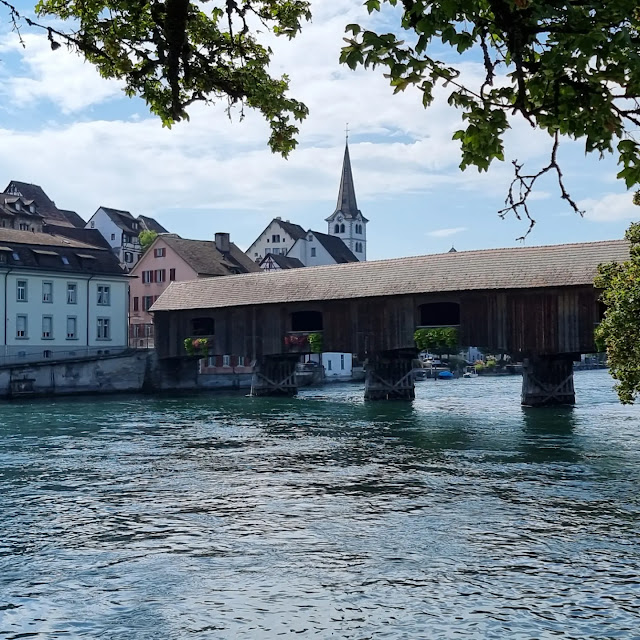 |
| Gailingen trestle bridge over the Rhine |
I won’t dwell on all the minutiae
of our holiday except for a few curious and interesting highlights. The next morning, we stop in the neighbouring
village, Hemmenhofen, and visit the house of the artist, Otto Dix. I have wanted to learn more about Otto Dix
because his early (Weimar) paintings capture beautifully the contrasts of rich
and poor in 1920s Germany. His triptych,
Metropolis (Die Grossstadt), painted in 1928 is a good example, contrasting
Cabaret like scenes in the centre panels with the grotesque images of the down
and outs seen in Germany after the first World War. Surely the producer and director of the film
Cabaret, must have had his figures in mind when devising the setting for the
Kit Kat Club?
All I knew about the painter
before going to his house was that Hitler had a great antipathy for his work,
his paintings being selected for the infamous Entartete Kunst (Degenerate Art)
exhibition held in Munich in 1937. But
he had been dismissed by the Nazis from his Professorship post in Dresden some
years before. In 1936 therefore, mindful
that he might need to escape Germany, he and his wife built the house which
overlooks Lake Constance, and is only a mile or two from the Swiss border. The photogravure reproductions of his
paintings are present in every room, and the experience is enhanced by an
audioguide in which his son, Jan, talks about their life together as a family
in Hemmenhofen. It seems that most of
his great works are in the Art Gallery in Stuttgart. Dix lived here until his death in 1969.
 |
| Die Grossstadt, Otto Dix |
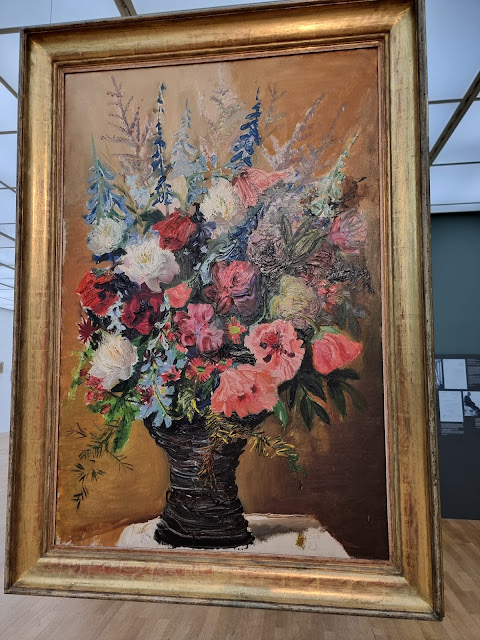 |
| This painting by Otto Dix sits in the Museum of Uncertain Provenance, above the Zeppelin museum. It belonged to a family named Strauss and was almost certainly purloined by the Nazis. Research to find the possible descendants of the owners is ongoing. |
The northern rim of the lake is
in Germany, mostly in Baden-Württemberg, and it seems like Germany’s ‘Gold
Coast’. Beautiful villas and apartments
rim the lakeside. Inland we cycle past
hundreds of apple orchards, and find it strange that we never seem to see
German apples in our shops. There are
many vineyards as well.
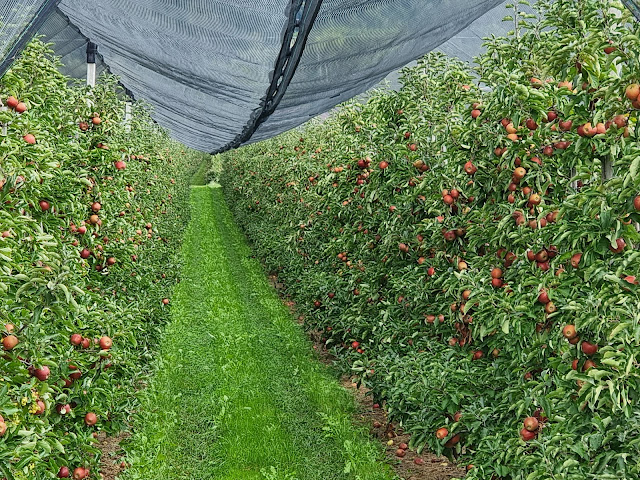
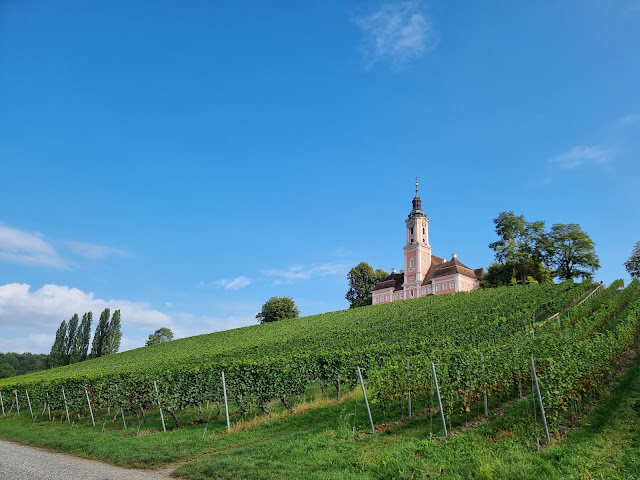
Friedrichshafen is a must see for
aviation (or dirigible) enthusiasts. It
houses the Zeppelin museum. Count
Zeppelin launched his first airship in Friedrichshafen (LZ1) in 1900 for a 20-minute
flight over Lake Constance. Lindsay and
I get two reductions in the entry fee.
One for being senioren and a
further reduction for having travelled there by bike. It is very popular, with Germans as well as
other tourists, though there is no irony for them, it seems, in looking at
German military top brass quaffing champagne in the Graf Zeppelin and the Hindenburg
in the 1930s. Another happy snap catches
Ferdinand Porsche and friends trying out a new tank destined for the German
army in 1943.
 |
| Aeroplane food isn't like this any more - items from the Zeppelins |
Further on we stay on the island
in the lake which is part of Lindau, and then cycle through the very small part
of Austria which borders the lake, namely the City of Bregenz, capital of the
Vorarlberg. We are too late for the
famous Bregenz opera festival, held on the seebühne (sea stage). There is a cable car in the city which whisks
you up the Pfänder mountain, to a height of 1064m. This is well worth the trip, and there is a
variety of bicycle routes down from the top which are very straightforward. In the sunshine at the top of the lift it
seems strange to look at the mountains to the east, for example the Valluga
above St Anton, only 40 km away.
Crossing the Rhine again takes us
into Switzerland, and our last night on the route is spent in Arbon, which was
important as the site where the Irish monk, St Gallus, set up his
ministry. We ponder how St Gallus
managed to travel there… He then moved a
short distance away to found the monastery of St Gallen.
 |
| Pfander cable car above the lake at Bregenz |
 |
| Not a blot on the landscape. Henry Moore outside the Wurth gallery in Rorschach |
 |
| No caption required |
 |
| Sunset on the Untersee |
The dog days of September back in
Poole are interrupted by weather systems from the Atlantic. At one moment sitting to eat lunch outside,
at another driven in by thunderstorms and torrential rain.
It’s hard to know what to make of
politics at the moment. Rumours that HS2
(a high speed rail network from London to the north, now billions over budget)
will be watered down or even abandoned.
Nervous politicians because we are now entering the party conference
season. All with an eye on a General
Election, a little more than a year away.
And Donald Trump, ever popular with Republicans, has been indicted on numerous charges, the clearest of which seems to have been that his assets were falsely inflated to gain loans at reduced rates.
The news has been dominated by
BBC fixations. One day it is a prisoner
at Wandsworth prison who has escaped by holding on to the underside of a
kitchen delivery lorry; on another day it is King Charles speaking execrable
French but seemingly going down a storm in Versailles; or a British made
missile in use in Ukraine; or more doctors’ strikes and the cancellation of
hospital appointments.
While we were away, the Vuelta a
Espana ended with a popular win for the American rider, Sepp Kuss. His team, Jumbo-Visma, have won all three
grand tours this year with three different winners.
But more sport, the Solheim Cup
(golf) has just ended with jubilation for the Europe team in retaining the cup,
but surely this should be tempered with the result that the final score was
Europe 14 - U.S.A. 14? And the rugby
world cup now features. A titanic match
between Ireland and South Africa ends with a narrow win for Ireland. Wales thrash Australia 40 points to 6.
October 1st, 2023
Very mild though overcast. September temperatures have been much above
average and October continues this. Swim
in the sea where the temperature is holding up, websites suggesting that it is
still 18 degrees C which is remarkably high.
The last three days have been
punctuated by many hours of adherence to the TV showing the Ryder Cup, held at
golf course Marco Simone, outside Rome.
Europe get off to a storming start and although America come back
strongly, the final day sees honours even in the singles competition but Europe
had done enough to win by a margin of 5 points, 16½ to 11½. Much breast beating to come from the U.S.A.
golf pundits. In two years’ time we are
in Long Island at Bethpage Black, and U.S. revenge is strong possibility.
Something to dwell on in the next
edition of the blog – chatting with my Edinburgh friend, and the changes in
things that preoccupy us, compared with when we were medical students. Looking back on 50 years since we qualified
as doctors. As a trailer for our musings,
here is something that came to me recently:
In the 1960s, when we imagined
ourselves adult and mature, incorrect on both counts, I watched a black and
white TV programme, a 1966 play of the sort that the BBC do not make or show
these days. It was called ‘The Snow
Ball’ and was based on a 1964 novel by Brigid Brophy, which has re-emerged
(reissued recently) as a cult classic.
The play starred Patrick Allen
(an acting hero of mine), who played the main character, at a New Year’s Eve masked
ball, where he was impersonating Don Giovanni.
An encounter with a masked woman dressed as Donna Anna resulted in a
tantalising and sexually charged conversation, but as I recall we don’t
discover what the outcome is (though the implications are obvious). The most charged dialogue that I remember is
that these two characters ask one another, ‘What do you think about?’ In my memory of the scene, Patrick Allen
asked Donna Anna this question. She
replied, ‘Mozart, and sex. What do you
think about?’ The reply was, ‘Mozart (pause), sex (pause), and death.’
According to current reviews of the novel, I have this the wrong way
round, and the first reply is that of Don Giovanni.
Later in the night a young couple
have their first sexual experience in the back of a Bentley, during a snowstorm
(yes, perhaps wishful thinking played a part in my juvenile appreciation of the
drama).
All this seemed extraordinarily
sophisticated to an 18-year old. But
then I read the novel and found it extremely pretentious. After the reissue of the novel recently, and
reading the adulatory reviews, I seem to be in a minority of one…
Our musings? We were eating in a reasonable Italian
restaurant in the heart of Edinburgh. G
said to me, ‘You know, when we were students, all we ever thought about was
sex. But now my food and this menu in
front of me seems much more important.’ A
remarkable frank confession, but then G does not pull punches when describing
some of our erstwhile colleagues, for example: ‘Very consultoid and dreadfully
dull.’ Or another, ‘She was very bright,
married X’s (Surgeon’s) son who only did medicine to please his bullying
father. He subsequently did history and
became an expert on the Battle of Trafalgar.’
Again, ‘… dull and boring; looked like a stooped old man, even as a
student.’ And finally, ‘Original Hooray
Henry, didn’t like his posh overbearing manner when I was a student, but then
found I rather liked him and we did ‘share a moment’’. I presume the latter to be a euphemism.
I suppose as students we did find
time for other things, art, culture, music – and packing away an enormous
amount of medical knowledge and experience, with its attending humour and
pathos, in a short time.
So now we move into Autumn, perhaps
literally and metaphorically, and yes, I do enjoy looking at a good menu.






